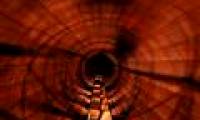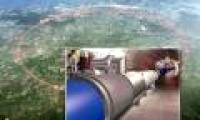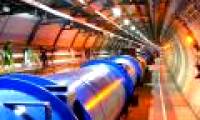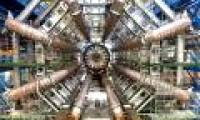
Nuclear and biological research centers, underground naval bases, high-powered radar stations and the first accelerator are all the most secretive places of the Soviet Union.

The world's largest particle accelerator is accelerating faster than expected and may soon unravel the universe's deepest mystery.

The European Atomic Research Organization (CERN) has successfully conducted experiments to create a direct collision between proton particles producing extremely large energy.

At the end of 2011, the world's largest particle accelerator, the LHC (Large Hadron Collider), will be temporarily shut down for a year to repair.

LHC is the world's most powerful particle accelerator, having a circumference of 27km, buried 100m deep underground in the French-Swiss border area.

The European Center for Nuclear Research (CERN) recently published its successful journal Nature in 'confinement' of hydrogen antimatter.
 Nuclear and biological research centers, underground naval bases, high-powered radar stations and the first accelerator are all the most secretive places of the Soviet Union.
Nuclear and biological research centers, underground naval bases, high-powered radar stations and the first accelerator are all the most secretive places of the Soviet Union. The world's largest particle accelerator is accelerating faster than expected and may soon unravel the universe's deepest mystery.
The world's largest particle accelerator is accelerating faster than expected and may soon unravel the universe's deepest mystery. The European Atomic Research Organization (CERN) has successfully conducted experiments to create a direct collision between proton particles producing extremely large energy.
The European Atomic Research Organization (CERN) has successfully conducted experiments to create a direct collision between proton particles producing extremely large energy. At the end of 2011, the world's largest particle accelerator, the LHC (Large Hadron Collider), will be temporarily shut down for a year to repair.
At the end of 2011, the world's largest particle accelerator, the LHC (Large Hadron Collider), will be temporarily shut down for a year to repair. LHC is the world's most powerful particle accelerator, having a circumference of 27km, buried 100m deep underground in the French-Swiss border area.
LHC is the world's most powerful particle accelerator, having a circumference of 27km, buried 100m deep underground in the French-Swiss border area. The European Center for Nuclear Research (CERN) recently published its successful journal Nature in 'confinement' of hydrogen antimatter.
The European Center for Nuclear Research (CERN) recently published its successful journal Nature in 'confinement' of hydrogen antimatter.
 NASA's 'Ninth Planet' Shows Signs of Being Friendly to Life
NASA's 'Ninth Planet' Shows Signs of Being Friendly to Life Why did American astronauts have to be quarantined when returning to Earth?
Why did American astronauts have to be quarantined when returning to Earth? China surprises the world by building a cable-stayed bridge 'above the clouds'
China surprises the world by building a cable-stayed bridge 'above the clouds' Why do women sleep less and wake up more than men?
Why do women sleep less and wake up more than men? Revealing the secret inside the stuffed animal claw machine, from there, summarizing experience to help you increase your winning rate many times over
Revealing the secret inside the stuffed animal claw machine, from there, summarizing experience to help you increase your winning rate many times over What would happen if you dug a hole through the Earth and jumped in?
What would happen if you dug a hole through the Earth and jumped in? Camera takes a photo that lasts 1,000 years
Camera takes a photo that lasts 1,000 years Was there nuclear war in ancient times?
Was there nuclear war in ancient times?